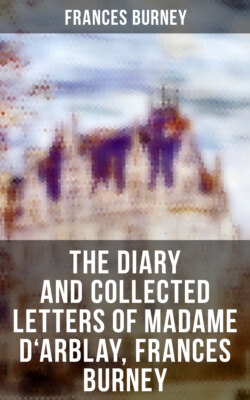Читать книгу The Diary and Collected Letters of Madame D'Arblay, Frances Burney - Frances Burney - Страница 120
На сайте Литреса книга снята с продажи.
A Drawing-room during a Fog
ОглавлениеThe subject was the last Drawing-room, which she had been in town to keep on Thursday, during the dense fog.
“I assure you, ma’am,” cried she to Mrs. Delany, “it was so dark, there was no seeing anything, and no knowing any body. And Lady Harcourt could be of no help to tell me who people were, for when it was light, she can’t see and now it was dark, I could not see myself. So it was in vain for me to go on in that manner, without knowing which I had spoken to, and which was waiting for me; so I said to Lady Harcourt, ‘We had better stop, and stand quite still, for I don’t know anybody, no more than you do. But if we stand still, they will all come up in the end, and we must ask them who they are, and if I have spoken to them yet, or not: for it is very odd to do it, but what else can we manage?’”
Her accent is a little foreign, and very prettily so; and her emphasis has that sort of changeability, which gives an interest to everything she utters. But her language is rather peculiar than foreign.
“‘Besides,”’ added she, with a very significant look, “‘if we go on here in the dark, maybe I shall push against somebody, or somebody will push against me—which is the more likely to happen.’”
She then gave an account of some circumstances which attended the darkness, in a manner not only extremely lively, but mixed, at times, with an archness and humour that made it very entertaining. She chiefly addressed herself to Mrs. Delany; and to me, certainly, she would not, separately, have been so communicative; but she contrived, with great delicacy, to include me in the little party, by frequently looking at me, and always with an expression that invited my participation in the conversation. And, indeed, though I did not join in words, I shared very openly in the pleasure of her recital.
“Well,” she continued, “so there was standing by me a man that I could not see in the face; but I saw the twisting of his bow; and I said to Lady Harcourt, ‘I am sure that must be nobody but the Duke of Dorset.’—‘Dear,’ she says, ‘how can you tell that?’—‘Only ask,’ said I; and so it proved he.”
“Yes,” cried the king, “he is pretty well again; he can smile again, now!”
It seems his features had appeared to be fixed, or stiffened. It is said, he has been obliged to hold his hand to his mouth, to hide it, ever since his stroke,—which he refuses to acknowledge was paralytic.
The queen looked as if some comic notion had struck her, and, after smiling a little while to herself, said, with a sort of innocent archness, very pleasing,
“To be sure, it is very wrong to laugh at such things,—I know that; but yet, I could not help thinking, when his mouth was in that way, that it was very lucky people’s happiness did not depend upon his smiles!”
Afterwards, she named other persons, whose behaviour and manners pointed them out to her, in defiance of obscurity.
“A lady,” said she, “came up to me, that I could not see, so I was forced to ask who she was; and immediately she burst into a laugh. ‘O,’ says I, ‘that can be only Mrs. De Rolles!’—and so it proved.”
Methinks, by this trait, she should be a near relation to my Miss Larolles!164
